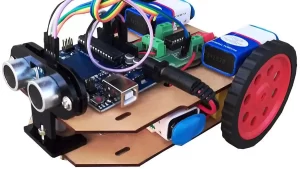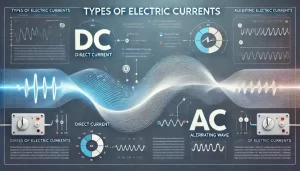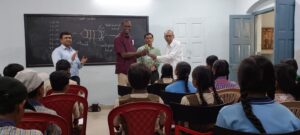Introduction
This course is designed for learning outcome based curriculum as part of the vocational training packages for the job role of Field Technician-Computing and Peripherals. The curriculum has been developed for the secondary students of vocational education and is aligned to the National Occupation Standards (NOSs) of a job role identified and approved under the National Skill Qualification Framework (NSQF).
The curriculum aims to provide children with employability and vocational skills to support occupational mobility and lifelong learning. It will help them to acquire specific occupational skills that meet employers’ immediate needs. The teaching process is to be performed through the interactive sessions in classrooms, practical activities in laboratories and workshops, projects, field visits, and professional experiences.
About Junior Software Developer Course
This course is for two years in 10+2 pattern. So for 11th standard the curriculum details are as follows –
11th Standard Curriculum
Part A Employability Skills
The Part-A of 11th standard is same as Junior Software Developer Course.
- Unit 1 Communication Skills – III
- Unit 2 Self-management Skills – III
- Unit 3 Basic ICT Skills – III
- Unit 4 Entrepreneurial Skills – III
- Unit 5 Green Skills – III
Part B Vocational Skills
- Unit 1 Basic Electronics and Computer Hardware Essentials
- Unit 2 Installation and Configuration of Desktop Operating System
- Unit 3 Computer Maintenance and Troubleshooting
- Unit 4 Occupational Health and Safety Practices
12th Standard Curriculum
Part A Employability Skills
The Part-A of 12th standard is also same as Junior Software Developer Course.
- Unit 1 Communication Skills – IV
- Unit 2 Self-management Skills – IV
- Unit 3 Basic ICT Skills – IV
- Unit 4 Entrepreneurial Skills – IV
- Unit 5 Green Skills – IV
Part B Vocational Skills
Unlike Junior Software Developer Course, this Part contains 6 units.
- Unit 1 Computer Network Essentials
- Unit 2 Installation and Configuration of Windows Server
- Unit 3 Installation and configuration of Linux Server
- Unit 4 Computer Network Maintenance and Troubleshooting
- Unit 5 IT Security
- Unit 6 Information Technology Infrastructure Library (ITIL) v4
List of Material Required
The list given below is suggestive and an exhaustive list should be prepared by the vocational teacher. Only basic tools, equipment and accessories should be procured by the Institution so that the routine tasks can be performed by the students regularly for practice and acquiring adequate practical experience.
- Rulers
- T-square
- Multi-tester
- Multi-meter – analog & digital
- Pliers
- Cutters
- Screw drivers
- Goggles
- Gloves
- Protractor
- LAN tester
- Antistatic wrist wrap
- Masks
- Crimping tools
- Punch down tools
- Flashlights
- Sharp pointed tweezers
- Mirror (inspection)
- Soldering iron
- De-soldering pump
- CRO
- Function generator
- UPS
- Power supply
- Power meter
- Signal detector
- Hubs
- Switches
- Modem/ router
- Server computer
- Peripherals – printers, scanner
- Desktop and laptop for installation and troubleshoot (as per number of students ratio 2:1)
- Windows 10 OS
- Windows Server 2016, Ubuntu Linux OS (free), Cent OS Server (free),
- Utility software
Electronic Components (Active and Passive)
ICs, PCB, CD / DVDs, UTP Cat. 5E/ 6 cables, RJ 45 modular plug, Board marker, White board, Schematic diagrams, Charts, Block diagrams, Layout plans, Location Plans, Instrumentation diagrams, Loop diagrams, System Control diagrams, Drawing boards
Field Visits & OJT (On-the-Job Training)
In a year, at least 3 field visits/educational tours should be organised for the students to expose them to the activities in the workplace. During summer or winter vacation, students can undergo one week on-the-job training in nearby industry or work place. Visit a Software Development Company and observe the following:
During the visit, students should obtain the following information from the organization:
- Computer System of various brands
- Computer parts and peripherals of various brands
- Specifications of various parts of computer system
- Comparison of various brands
- Types of computers
- Types of printers
- Types of scanners
- External and Internal Hard Disk
- Storage capacity of various storage devices
- Comparison of various parts based on cost
- Tools and equipment required for computer assembly.
- Cost benefit analysis to purchase computer.
- Specifications of computer based on the work requirement.
Teachers Eligibility (Required Qualification)
Qualification and other requirements for appointment of vocational teachers/trainers on contractual basis should be decided by the State/UT. The suggestive qualifications and minimum competencies for the vocational teacher should be as follows:
Bachelor of Engineering / Technology in Electronics or Computer Science / Technology OR Master of Computer Application (MCA) OR Master of Science (Computer Science) OR Master of Science (Information Technology) OR NIELIT “B” Level Certificate.
It is recommended to have additional qualification such as CCNA, CCP or any other diploma in computer hardware maintenance.
Minimum Competency Required
The candidate should have a minimum of 1 year of work experience in the same job role. He should be able to communicate in English and local language. He should have knowledge of equipment, tools, material, Safety, Health & Hygiene.
Age Limit
The Teacher must be between 18-37 years as on January 01 2024. Age relaxation to be provided as per Govt. rules.
More details about syllabus and scope and limitations will be published soon on our website. Please click here to subscribe to receive email notifications when we publish new information about this subject.








